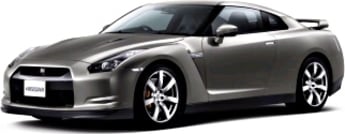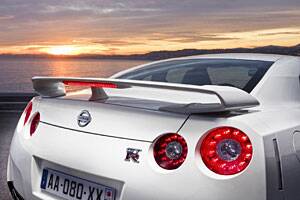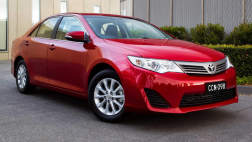There is more power and torque from its thumping twin-turbo V6 engine, a little less weight and drag, and the added bonus of more refinement inside. The 2011-model R35 also comes with bigger brakes and new tyres, some chassis strengthening, LED daytime running lamps and an extended aero diffuser under the tail.
The upgrade work is all designed to make the car quicker and more responsive - and shave time off its laps at the Nurburgring in Germany - as well as re-igniting passion for the car among Australia's keenest drivers.
That passion was reflected in a giant turnout at Phillip Island to celebrate the 20th anniversary of the GT-R's first Bathurst win, at an event attended by Mr GT-R - Katzutoshi Mizuno - and Aussie racers Fred Gibson and Jim Richards.
"The GT-R is really the heart-and-soul of Nissan," says Dan Thompson, managing director of Nissan Australia.

The downside on the third version of the R35 is a starting price that has blown out to $168,800, and a more extreme driving experience that could be too much for some people in day-to-day conditions. But get it on a track, like Phillip Island .
Value
The GT-R has been a bang-for-your-buck winner from the beginning, even back in the days of the R32 model that introduced the car to Australia as an official Nissan. But things have slipped this year, with the decision to drop the entry-grade car and tougher opposition from the German supercar bunkers. It's still a massively impressive package, but the $168,800 bottom line comes in well above the starting price for a BMW M3 at $152,300 and the Mercedes-Benz C63 AMG from $152,800, and also available with a Performance Pack tweak and an extra 22 kiloWatts.
 The GT-R is better equipped for 2011 - with everything from Recaro-designed sports buckets to seat belts made from softer material - but the bottom line is still a $13,000 jump from the previous starting mark for Godzilla. And it doesn't get the capped-price service protection of the rest of the Nissan family.
The GT-R is better equipped for 2011 - with everything from Recaro-designed sports buckets to seat belts made from softer material - but the bottom line is still a $13,000 jump from the previous starting mark for Godzilla. And it doesn't get the capped-price service protection of the rest of the Nissan family.
"It still is much cheaper for the performance that it gives," says Nissan's local product specialist, Darren Holland.
"The money has gone into performance improvements. The power, the torque, and the engineering that's gone into the car."
Technology
The GT-R has always been a techno treat and this time around is no different, with the 3.8-litre V6 engine tweaked to release 390 kiloWatts and 612 Newton-metres -up by 33 and 24 respectively - while also cutting fuel economy to a claimed average of 12.0 litres/100km. The suspension has been tweaked with alloy shock absorbers, a strengthening bar across the front-suspension towers, and a support panel on the dash ahead of the passenger.
The Brembo brakes are now a monoblock design, there are forged alloy wheels from Rays, and the startline ability of the GT-R has been boosted by a system - engaged through R-Mode and VDC-R - that promises consistent 0-100km/h sprints in around 3.0 seconds. Although you do have to cool the transmission after four consecutive runs.
Design
Only a GT-R fan - and there are plenty - will pick the differences for 2011. The basic body shape is unchanged and the tweaking is all in the details - like LED daytime lamps, a large grille, the rear diffusor and what Nissan calls a two-level 'rectifier' to channel air around the nose.
Inside, there is real carbon fibre in the dash, the new seats and belts, and a soft-touch panel on top of the dash that gives a more upmarket look and feel.
Safety
There are no real changes to the safety package, although the latest Dunlop Sport Maxx tyres and bigger brakes are claimed to give better grip in all conditions and much better braking on wet roads. Mizuno says the GT-R generates more wet braking grip than a 370Z on a dry road.
Of course, it comes with a six-airbag cabin, ABS brakes and ESP stability control.
Driving
The GT-R has always been an extreme machine, and the tweaking to the 2011 model makes it even more of a love-or-hate machine. We love its punchy performance and the admiring glances from rival drivers, as well as the knowledge that any stop-light contest is a no- contest. And it is brutally quick. But the suspension is brutal too, even with the adjustable settings switched to comfort. And the amount of noise and slap and harshness from the transmission system rivals a World Rally Car on the way to a special stage. It's not a car to drive if you want a quiet or easy life.
But GT-R fans will love the improvements, which make it brilliantly better when you want to goooooooooo.
The launch control system is stonkingly good and truly the best Carsguide has sampled - with the ability to turn stomaches to mush.
The extra power and torque means the car is going fast for more of the time, with better response and less lag. The chassis feels a little more responsive on the road, and when we get to Phillip Island it really shows its best side.
The GT-R can run without fear or favour on a racetrack, and easily tops 260km/h down the front straight, with incredible cornering grip and slingshot exists from all corners.
It's not as finely edged as a Porsche, and overheats its tyres quickly if you push hard, but it will get away from an M3 or C63 with a sympathetic and talented driver.
The Series III GT-R is even better than before and incredible fun, provided you can put up with the ride and wide turning circle and restricted three-quarter vision and difficulty in parking. At Phillip Island, all that day-to-day stuff is just fluff. And the GT- R is brilliant.
Nissan GT-R 2011:
| Engine Type | Turbo V6, 3.8L |
|---|---|
| Fuel Type | Premium Unleaded Petrol |
| Fuel Efficiency | 12.0L/100km (combined) |
| Seating | 4 |
| Price From | $69,630 - $80,080 |
Verdict
What a beast. What a ride.
Range and Specs
| Vehicle | Specs | Price* |
|---|---|---|
| Base | 3.8L, Premium Unleaded Petrol, 6 SPEED AUTO DUAL CLUTCH | $65,560 - $75,350 |
| Premium | 3.8L, Premium Unleaded Petrol, 6 SPEED AUTO DUAL CLUTCH | $67,210 - $77,220 |








.jpg)




.jpg)


Comments